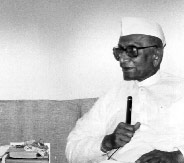

 |  |
 One of the first steps taken by the new government was to try to consolidate its hold over the states. Arguing that in those states where Congress had lost in national elections, it had also lost the mandate to rule even at the state level, the government dismissed nine Congress-ruled state Governments, and ordered fresh elections to their state assemblies. In the assembly elections, held in June 1977, Janata and its allies came out victorious in these states except in Tamil Nadu where AIADMK won. In West Bengal, the CPM, a Janata ally, gained an absolute majority.
Control over both the parliament and the state assemblies enabled the Janata Party to elect unopposed its own candidate, N. Sanjeeva Reddy, as the President of the Union in July 1977. One of the first steps taken by the new government was to try to consolidate its hold over the states. Arguing that in those states where Congress had lost in national elections, it had also lost the mandate to rule even at the state level, the government dismissed nine Congress-ruled state Governments, and ordered fresh elections to their state assemblies. In the assembly elections, held in June 1977, Janata and its allies came out victorious in these states except in Tamil Nadu where AIADMK won. In West Bengal, the CPM, a Janata ally, gained an absolute majority.
Control over both the parliament and the state assemblies enabled the Janata Party to elect unopposed its own candidate, N. Sanjeeva Reddy, as the President of the Union in July 1977.The Janata government took immediate steps to dismantle the authoritarian features of the Emergency regime and to restore liberal democracy. It restored fundamental rights and full civil liberties to the Press, political parties and individuals. Through the 44th Constitutional Amendment, it also modified the 42nd Amendment passed during the Emergency, repealing those of its provisions that had distorted the Constitution. The rights of the Supreme Court and High Courts to decide on the validity of central or state legislation were also restored. After the first year of Janata rule, the economy started drifting with both agriculture and industry showing stagnation or low rates of growth. Severe drought conditions and devastating floods in several states affected agricultural production in 1978 and 1979. Prices began to rise sharply, especially as foodgrains stocks had been used up in the ‘Food for Work’ programme. International prices of petroleum and petroleum products again rose steeply. The heavy deficit financing in the 1979 budget, presented by Charan Singh as finance minister, also had a marked inflationary impact. 1979 also witnessed widespread shortages of kerosene and other goods of daily consumption. By the end of that year, inflation had gone beyond 20 per cent. The Janata government’s tenure was too brief for it to leave much of an impact on India’s foreign policy, though while continuing to function within the existing, widely accepted framework, it did try to reorient foreign policy under visionary leadership of Atal Behari Vajpayee. Relations with Pakistan improved. New policy of ‘genuine non-alignment’ was formulated, which strengthened ties with US and Britain while maintaining its close relations with the Soviet Union. Holding the party together seems to have been a major preoccupation of the Janata leaders. Already disintegrating by the end of 1977, by 1978-79, the government, lacking all direction, was completely paralyzed by the constant bickering and infighting in the party both at the Centre and in the states. The different constituents were too disparate historically, ideologically and programmatically bound only by an anti-Indira Gandhi sentiment and the desire for power. Jan Sangh, its best organized and dominant component with ninety MPs, was populist with umbilical ties to RSS which provided it cadres and ideology and which was not willing to let it be incorporated in or integrated with other parties. Congress (0) was conservative and basically Congress in mentality. BLD was a strictly rich-peasant party with no all-India or developmental vision. The Socialists were largely ideology less and rootless except in Bihar. |
Copyright ©2000 indiansaga.info. All rights reserved.
By using this service, you accept that you won't copy or use the data given in this website for any commercial purpose.
The material on indiansaga.info is for informational & educational purpose only.
This site is best viewed at 800 X 600 picture resolution.